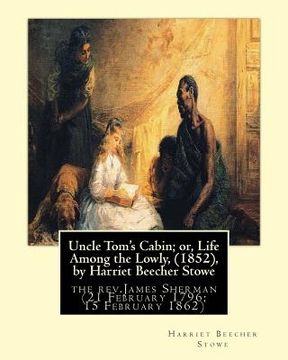Uncle Tom's Cabin; or, Life Among the Lowly, (1852), by Harriet Beecher Stowe: the rev.James Sherman (21 February 1796 - 15 February 1862), was an Eng (en Inglés)
Reseña del libro "Uncle Tom's Cabin; or, Life Among the Lowly, (1852), by Harriet Beecher Stowe: the rev.James Sherman (21 February 1796 - 15 February 1862), was an Eng (en Inglés)"
Uncle Tom's Cabin; or, Life Among the Lowly, is an anti-slavery novel by American author Harriet Beecher Stowe. Published in 1852, the novel "helped lay the groundwork for the Civil War", according to Will Kaufman.Uncle Tom's Cabin was the best-selling novel of the 19th century and the second best-selling book of that century, following the Bible. It is credited with helping fuel the abolitionist cause in the 1850s. In the first year after it was published, 300,000 copies of the book were sold in the United States; one million copies in Great Britain.In 1855, three years after it was published, it was called "the most popular novel of our day."The impact attributed to the book is great, reinforced by a story that when Abraham Lincoln met Stowe at the start of the Civil War, Lincoln declared, "So this is the little lady who started this great war."The quote is apocryphal; it did not appear in print until 1896, and it has been argued that "The long-term durability of Lincoln's greeting as an anecdote in literary studies and Stowe scholarship can perhaps be explained in part by the desire among many contemporary intellectuals ... to affirm the role of literature as an agent of social change." The book and the plays it inspired helped popularize a number of stereotypes about black people. These include the affectionate, dark-skinned "mammy"; the "pickaninny" stereotype of black children; and the "Uncle Tom", or dutiful, long-suffering servant faithful to his white master or mistress. In recent years, the negative associations with Uncle Tom's Cabin have, to an extent, overshadowed the historical impact of the book as a "vital antislavery tool." The book opens with a Kentucky farmer named Arthur Shelby facing the loss of his farm because of debts. Even though he and his wife Emily Shelby believe that they have a benevolent relationship with their slaves, Shelby decides to raise the needed funds by selling two of them-Uncle Tom, a middle-aged man with a wife and children, and Harry, the son of Emily Shelby's maid Eliza-to a slave trader. Emily Shelby is averse to this idea because she had promised her maid that her child would never be sold; Emily's son, George Shelby, hates to see Tom go because he sees the man as his friend and mentor. When Eliza overhears Mr. and Mrs. Shelby discussing plans to sell Tom and Harry, Eliza determines to run away with her son. The novel states that Eliza made this decision because she fears losing her only surviving child (she had already miscarried two children). Eliza departs that night, leaving a note of apology to her mistress. Tom is sold and placed on a riverboat which sets sail down the Mississippi River. While on board, Tom meets and befriends a young white girl named Eva. Eva's father Augustine St. Clare buys Tom from the slave trader and takes him with the family to their home in New Orleans. Tom and Eva begin to relate to one another because of the deep Christian faith they both shar.During Eliza's escape, she meets up with her husband George Harris, who had run away previously. They decide to attempt to reach Canada. However, they are tracked by a slave hunter named Tom Loker. Eventually Loker and his men trap Eliza and her family, causing Phineas to push Loker down a cliff after George had shot him in the side. Worried that Loker may die, Eliza convinces George to bring the slave hunter to a nearby Quaker settlement for medical treatment.Back in New Orleans, St. Clare debates slavery with his Northern cousin Ophelia who, while opposing slavery, is prejudiced against black people. St. Clare, however, believes he is not biased, even though he is a slave owner. In an attempt to show Ophelia that her views on blacks are wrong, St. Clare purchases Topsy, a young black slave. St. Clare then asks Ophelia to educate her.......

